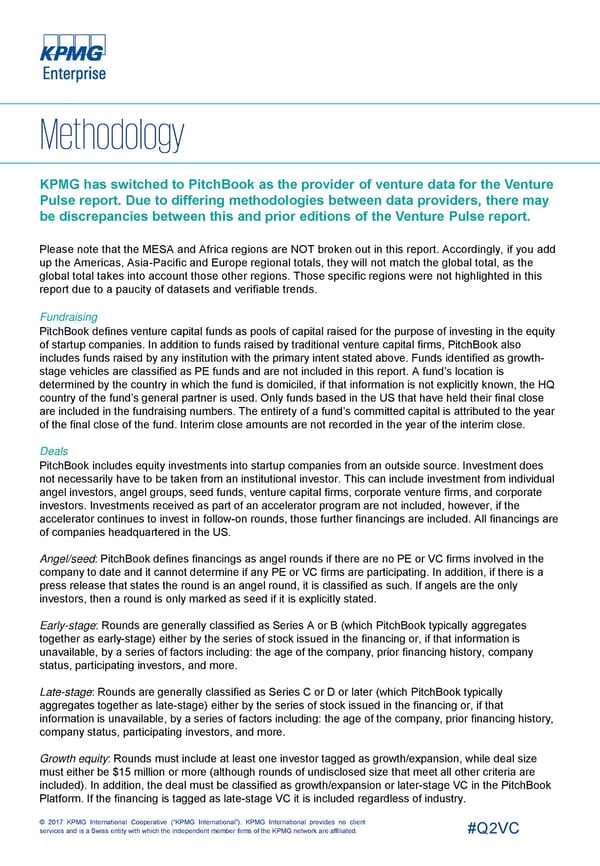KPMG has switched to PitchBook as the provider of venture data for the Venture Pulse report. Due to differing methodologies between data providers, there may be discrepancies between this and prior editions of the Venture Pulse report. Please note that the MESA and Africa regions are NOT broken out in this report. Accordingly, if you add up the Americas, Asia-Pacific and Europe regional totals, they will not match the global total, as the global total takes into account those other regions. Those specific regions were not highlighted in this report due to a paucity of datasets and verifiable trends. Fundraising PitchBook defines venture capital funds as pools of capital raised for the purpose of investing in the equity of startup companies. In addition to funds raised by traditional venture capital firms, PitchBook also includes funds raised by any institution with the primary intent stated above. Funds identified as growth- stage vehicles are classified as PE funds and are not included in this report. A fund’s location is determined by the country in which the fund is domiciled, if that information is not explicitly known, the HQ country of the fund’s general partner is used. Only funds based in the US that have held their final close are included in the fundraising numbers. The entirety of a fund’s committed capital is attributed to the year of the final close of the fund. Interim close amounts are not recorded in the year of the interim close. Deals PitchBook includes equity investments into startup companies from an outside source. Investment does not necessarily have to be taken from an institutional investor. This can include investment from individual angel investors, angel groups, seed funds, venture capital firms, corporate venture firms, and corporate investors. Investments received as part of an accelerator program are not included, however, if the accelerator continues to invest in follow-on rounds, those further financings are included. All financings are of companies headquartered in the US. Angel/seed: PitchBook defines financings as angel rounds if there are no PE or VC firms involved in the company to date and it cannot determine if any PE or VC firms are participating. In addition, if there is a press release that states the round is an angel round, it is classified as such. If angels are the only investors, then a round is only marked as seed if it is explicitly stated. Early-stage: Rounds are generally classified as Series A or B (which PitchBook typically aggregates together as early-stage) either by the series of stock issued in the financing or, if that information is unavailable, by a series of factors including: the age of the company, prior financing history, company status, participating investors, and more. Late-stage: Rounds are generally classified as Series C or D or later (which PitchBook typically aggregates together as late-stage) either by the series of stock issued in the financing or, if that information is unavailable, by a series of factors including: the age of the company, prior financing history, company status, participating investors, and more. Growth equity: Rounds must include at least one investor tagged as growth/expansion, while deal size must either be $15 million or more (although rounds of undisclosed size that meet all other criteria are included). In addition, the deal must be classified as growth/expansion or later-stage VC in the PitchBook Platform. If the financing is tagged as late-stage VC it is included regardless of industry. © 2017 KPMG International Cooperative (“KPMG International”). KPMG International provides no client services and is a Swiss entity with which the independent member firms of the KPMG network are affiliated. #Q2VC
 Asia Page 25 Page 27
Asia Page 25 Page 27